Guión:
Stephen GlantzCámara:
Joseph VilsmaierMúsica:
Chris HeyneReparto:
Gedeon Burkhard, Lale Yavas, Lena Beyerling, Sibel Kekilli, Roman Roth, Brigitte Grothum, Hans-Jürgen Silbermann, Sharon Brauner, Juraj Kukura (más)Streaming (1)
Sinopsis(1)
Año 1943. Los nazis quieren "limpiar" Berlín de judíos definitivamente. Más de 70.000 ya han sido deportados de la ciudad. En abril de 1943 sale de la estación de Grunewald un tren con 688 judíos hacia Auschwitz. El viaje dura seis días. En el tren comienza una lucha contra el calor, el hambre y la sed. En su desesperación, algunos intentan huir; entre ellos, Henry (Gedeon Burkhard), Lea (Lale Yavas) y Ruth (Sibel Kekilli). Pero el tiempo apremia y Auschwitz se acerca cada vez más... (Flins & Piniculas)
(más)Reseñas (2)
Vi El último tren a Auschwitz en marzo de 2008 en un cine antiguo poco común (en el pueblo de Nučice, cerca de Praga, el cine tenía baños secos, ¡letrinas!), lo que contribuyó enormemente a la atmósfera de la película y a mi impresión positiva de ella. Hay que apreciar la intención de los cineastas de mostrar la intensidad del Infierno previo, mientras que otros cineastas sólo muestran el Infierno en sí. El último tren a Auschwitz, ambientada en un tren con destino a Auschwitz, termina con la llegada al infierno, con el espectador ya tan horrorizado allí que no necesita ni quiere ir más allá. Al principio, la película parece el debut como director de un ingenuo realizador de comedias teatrales, pero poco a poco se convierte en un drama deprimente, beneficiándose del ambiente acartonado y de la etiqueta bien establecida de «así es como era en realidad». Es una pena que la película no consiga sacar más partido de los personajes individuales.
()
This is one in a long series of films that attempt to convey the horror of the Holocaust to contemporary audiences. However, I certainly didn't feel like I was having an exceptional cinematic experience. Some of the reservations mentioned in the comments have a real basis. The film is a bit rough in places and some scenes look unnatural, and yet the foundation, i.e., the drama of people condemned to death, who are herded into cattle cars and die of thirst in tropical heat, still functions. The incident with the spilled bucket, the small dramas resulting from a lack of personal space, and clinging to futile hopes, are all powerful moments that make the film function decently, and the cast is certainly not bad. The film is most harmed by the fact that it was produced in a German setting and tries to justify the idea that many Germans thought differently and tried to "help and protect" however they could despite the repulsive nature of Nazism. That is why there is a scene where German soldiers returning from the eastern front share their supplies with a Jewish transport and even come into conflict with the guarding SS officers, risking a shootout with their commander. Anyone who has any idea about the intense indoctrination of anti-Semitism that the Wehrmacht was subjected to, the strong tradition of anti-Semitism even before the fascists came to power, the extent to which units in the east were involved in war crimes, the level of identification with the regime that existed in the army, and the draconian punishments for any cooperation with the enemy, can only laugh at such fantasy. Especially when they realize the strict discipline that service in the Wehrmacht demanded and the privileged position that the SS units held. No, not even my fondness for Dana Vávrová will lead me to give it four stars. Overall impression: 65%.
()

